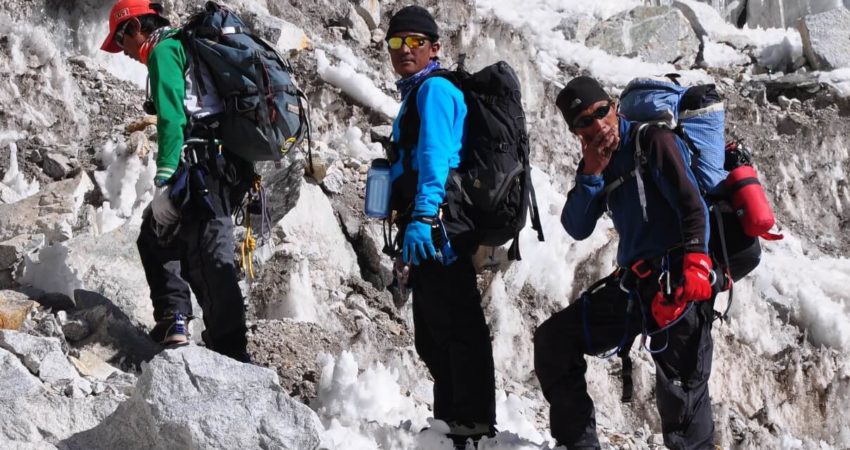When you are climbing or trekking in Nepal, you will meet many Sherpa people. What can you expect from them?
The term “sherpa” has entered our language as a term for someone who carries things: “I need help carrying these bags, can you be a sherpa for me?” Sherpa climbers are usually responsible for carrying all the team’s equipment up the mountain in “loads”. A Sherpa may carry 10 – 20 loads on an expedition. Sometimes going from basecamp to C2 and back in a day to drop a load. These loads include tents, stoves, gas, food and oxygen.
All that stuff has to get to basecamp too and Sherpas take care of that. Either yaks (herded and owned by Sherpas) or porters (usually Sherpa, Tamang or other local people) carry all these loads to basecamp. So carrying is a big part of what they help us with.
“the most experienced high altitude climbers on the planet”
Guiding is another. Although very few climbing Sherpa have officially recognized guiding credentials, many of them are the most experienced high altitude climbers on the planet with summits of Everest and other 8000m mountains counted in double figures. They are very familiar at recognizing signs of altitude sickness, hypoxia, fatigue, frostbite and cerebal/pulmonary edema. These are essential skills for any climbing guide or leader and there are some western guides on Everest that have tremendous mountain knowledge, expertise and decision making, but all at lower altitudes in the Alps or Rockies and they rely heavily on their climbing Sherpa for high altitude assistance.
Hosting is another service that Sherpas provide. Perhaps not a “service” so much as a by product of their nature. The Sherpa people are some of the kindest, most thoughtful people in the world. They almost always seem to think of your needs before theirs, to anticipate how they can help you before you’ve realized that you need help and time and again I’ve been welcomed into homes for delicious and sometimes elaborate meals that I know I didn’t earn, but which my hosts are happy to provide. The sincerity of both their welcomes and goodbyes leave profound memories for visitors.
Many climbers develop friendships with Sherpa people that last for decades and not just climbing Sherpa. There are lodge owners and shopkeepers who recognize me, remember my name and welcome me back to their village or home when I return to Nepal. If you’re reading this and you’ve been trekking in Nepal, I know you’re nodding your head when you think about the happy, friendly, generous Sherpa people you’ve known.
All that stuff has to get to basecamp too and Sherpas take care of that. Either yaks (herded and owned by Sherpas) or porters (usually Sherpa, Tamang or other local people) carry all these loads to basecamp. So carrying is a big part of what they help us with.
